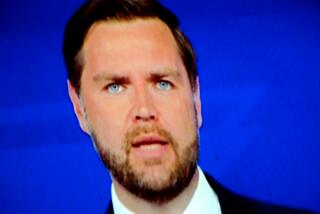Democrats Face Uphill Final Lap : Dukakis Sees Tougher Task After Debate
- Share via
WASHINGTON — With Republicans exuding optimism and Democrats sounding grim, the 1988 presidential campaign moved into the home stretch Friday following the final debate between George Bush and Michael S. Dukakis.
“If I were working for Michael Dukakis, I’d be sending out resumes this morning,” said Arizona Sen. John McCain, who like other GOP leaders was breathing easier in the wake of Vice President Bush’s strong showing in the Los Angeles debate.
Democrats were not yet prepared to accept that mordant assessment, at least not publicly. But they could not deny the sobering reality that Dukakis had failed to use the debate to reverse the tide of the campaign--and that no other obvious opportunity for carrying out that difficult task loomed on the political horizon.
Shows Few Illusions
Their candidate himself seemed to cherish few illusions. “The road ahead of us is going to be tough,” Dukakis conceded as he campaigned in California on the morning after his televised confrontation with Bush.
The best hope the Democrats could offer was the prospect that voters might start paying more attention to the campaign as the Nov. 8 election neared, creating an opening for the Massachusetts governor to catch up.
“The next three weeks are going to be a lot longer and more important than the six preceding months,” predicted Democratic pollster Mark Mellman, who advised the presidential campaign of Tennessee Sen. Albert Gore Jr.
Democrats point out that Dukakis trails by only single digits in the polls. And they argue that his apparently greater deficit in the Electoral College, reflected in state polls, could swiftly be changed.
Wants 5 Percentage Points
Dukakis pollster and senior strategist Tom Kiley argues that if Dukakis could gain 5 percentage points or so in the national polls, he would be able to compete seriously in a number of states that most tallies now put in Bush’s column. Among them are Arkansas and Kentucky in the South and Montana and Colorado in the West.
But Republicans scoffed at the notion that Democratic difficulties could be solved by picking up strength in the polls.
“That’s like a doctor who tries to cure a patient by getting rid of the symptoms,” contended UCLA political scientist John Petrocik, a consultant to the Bush campaign. He said the Dukakis campaign had yet to develop a strategy or a message that it would need to produce improvement in the national surveys.
Solutions Stump Democrats
Even Democrats had a hard time finding reason to believe that their candidate could accomplish something in the next three weeks that has been beyond reach up to now.
Professionals in both parties give many reasons--particularly the relative prosperity in the country and Bush’s well-disciplined campaign organization--for Dukakis’ plight. But most analysts agree that the fundamental cause of Dukakis’ problems lies with the candidate himself and his difficulty in giving voters a convincing reason to vote for him.
Dukakis’ awkwardness in communicating with the mass of voters was all too evident in the UCLA debate Thursday night, as Democrats were forced to admit.
“Maybe he doesn’t stand up in a debate and articulate on the spur of the moment in an instant analysis,” said Democratic Sen. John Kerry from Dukakis’ own state of Massachusetts. “But the fiber of this man is good and decent, and I think he has an understanding of what this country needs.”
While Democrats apparently still need to develop a strategy in the closing weeks of the campaign, the future for the Bush campaign seems clear--stay the course.
‘Controlling the Agenda’
“The campaign that does the best job of controlling the agenda is the campaign that’s going to win,” said Bush campaign chairman James A. Baker III. “I think so far we’ve been fortunate in being able to do that for the most part, and we want to try and continue to do it for the next 3 1/2 weeks.”
While there was some well-intentioned talk on both sides about reducing the negativism apparent in the campaign in recent weeks, political realities suggest that any such cutbacks will be minimal at best.
Republicans contended that Bush could not afford to abandon his harsh attacks on Dukakis’ record, a strategy that has boosted the Democrat’s negative ratings in the polls and contributed greatly to Bush’s lead.
“He (Bush) needs to keep up the same aggressive effort to define Michael Dukakis that he’s been doing so people don’t forget why it is they don’t want to vote for him,” GOP consultant Eddie Mahe said.
Asked if Bush would move away from his negative approach to Dukakis, the vice president’s press secretary, Sheila Tate, said, “What you call negative, we call comparative.”
Will ‘Stick to the Plan’
And Bush campaign manager Lee Atwater told reporters traveling with the vice president in California that Bush would “stick to the campaign plan we’ve had all along--50% comparative, 50% positive. There’s not going to be any attempt to change the style.”
As for the Democrats, sources in the Dukakis campaign promise a new wave of positive commercials next week.
But other Democrats argue that Dukakis must attack Bush if he wants to preserve his slim chance of winning. “There isn’t enough time left to reduce Dukakis’ negatives with positive commercials,” contended pollster Mellman. Dukakis’ only choice, he said, is to lash out at Bush.
More to Read
Get the L.A. Times Politics newsletter
Deeply reported insights into legislation, politics and policy from Sacramento, Washington and beyond. In your inbox twice per week.
You may occasionally receive promotional content from the Los Angeles Times.










